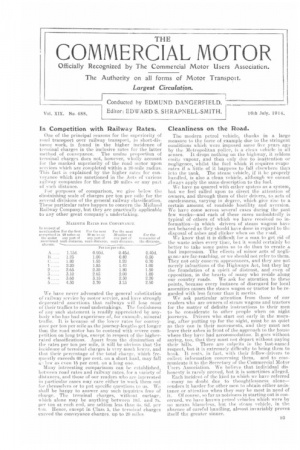In Competition with Railway Rates.
Page 1

If you've noticed an error in this article please click here to report it so we can fix it.
One of the principal reasons for the superiority -of road transport over railway transport, in short-distance work, is found in the higher incidence of terminal charges in the inclusive rates for the latter method of conveyance. The undue. proportion of terminal charges does not, however, wholly account for the marked superiority of-the road motor upon services which are completed within a 20-mile radius. This fact is explained by the higher rates for conveyance which are. sanctioned in the Acts of various railway companies for the first 20 miles or any payt of etch distance.
For purposes of comparison, we give below the diminishing scale of charges per ton per wile for the several divisions of the general railway classification. These particular rates happen to concern the Midland Railway Company, but they are practically applicable to any other great company's undertaking.
We have never advocated the general substitution of railway service by motor service, and have strongly deprecated assertions that railways will lose most of their traffics to road undertakings. The foolishness of any such statement is readily appreciated by anybody who has had experience of, for example, mineral traffic. It is because of the lower rates for conveyance per ton per mile as the journey-lengths get longer that. the road motor has to contend with severe competition on long trips, except in respect of the higherrated classifications. Apart from the -diminution of the rates per tort per mile, it will be obvious that the incidente of terminal charges is very much lower, and that, their percentage of the total charge, which frequently exceeds 60 per cent. on a short haul, may fall as low as even 15 per cent, on a long one. Many interesting comparisons can be established, between road rates and railway rates. for a variety of distances, and those of our readers who are interested in particular eases may care either to work them out for themselves or to put specific questions to us. We shall be happy to answer any such inquiries free of charge. The terminal charges, without cartage, hich alone may be anything between MI. and as. per ton at each end, are seldom less than Os. Od. per ton. Hence, except in Class 5, the terminal charges exceed the conveyance charges, up to 20 miles..
Cleanliness on the Road.
The modern petrol vehicle, thanks in a large measure to the force of example due to the stringent conditions which were imposed sonic five years ago by the Metropolitan police, is a clean 'aisle in all senses. it drops nothing on the highway, it seldom emits vapour, and then only due to inattention or negligence, whilst the fuel which it requires evapu rates if a. little of it happens to fall elsewhere than into the tank. The steam vehicle, if it he properly handled, is also a clean vehicle, although we cannot always apply the same description to the fuel. We have no quarrel with either system as a system, but we feel called upon to direct the attention of owners, and through them of their drivers, to acts of carelessness, varying in degree, which give rise to a certain amount of roadside hostility and aversion. We have tome across several cases during the past few weeks—and each of these cases undoubtedly is typical. of others of which we have received no information—in which drivers of steam wagons have not behaved as they should have done in regard to the disposal of ashes arid clinker when on the read.
We know that it is difficult for a man to get rid of the waste ashes every time, bot it would certainly be better to take sonic pains so to do than to create a bad impression. The effects of minor acts of negligence are far-reaehing, or we should not refer to them. They not only concern appearances, and they are not merely infractions of the Highways Act, but they lay the foundation of a spirit of distrust, and even of epposition, in the hearts of many who reside along our country roads. We ask for attention to these points, because every instance of disregard for local amenities causes the steam wagon or tractor to be regarded with less favour than it merits.
We ask particular attention from those of our readers who are owners of steam wagons and tractors for the matter of definite instructions to their men to be considerate to other people when on night journeys. Drivers who start out, early in the morning, after putting up for the night, must be as quiet as they can in their movements, and they must not leave their ashes in front of the approach to the house where they have had accommodation. IL goes without saying, too, that they must not depart without paying
their bills. There are culprits in the last-named respect, but it is extremely difficulty to bring them to book. It rests, in fact, with their fellow-drivers to collect information concerning them, and to communicate it to the Secretary of the Commercial Motor Users Association. We believe that individual dia. honesty is rarely proved, but it. is sometimes alleged.
Each incident of the kind to which we have referred --many no doubt due to thoughtlessness alone— renders it harder for other men to obtain either assistance or attention when they may be most in need of it. Of course, so far as noisiness in starting out is concerned, we have knswn petrol vehicles which were by no means blameless, hut the steam vehicle, in the absence of careful handling, almost invariably proves itself the greater sinner.
























